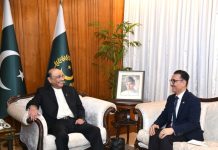Staff Report
ISLAMABAD: The families of Kashmiris killed in Zakoora and Tengpora massacres in 1990 by the Indian forces still await justice as India continues to ignore their repeated calls for taking the culprits to task.
On March 1, 1990, Indian security forces committed twin massacres in Zakoora and Tengpora Bypass in the Indian Illegally Occupied Jammu and Kashmir that left 26 and 21 people dead respectively.
In Zakoora, the Indian army killed 26 people by opening fire on peaceful protesters while they were heading toward the office of United Nations Military Observer Group for India and Pakistan (UNMOGIP) to submit a memorandum seeking resolution to the Kashmir dispute.
Likewise, the Indian army targeted two buses near Tengora Bypass killing 21 unarmed Kashmiris including five women.
In 1990, four massacres happened in IIOJK – most of them in Srinagar – targeting the Kashmiri Muslims.
The first massacre occurred on January 21, 1990 at the Gaw Kadal bridge in which over 50 Kashmiri Muslim demonstrators were gunned down by the Central Reserve Police Force personnel.
The second incident happened in Handwara on January 25, 1990 in which at least nine civilians were killed.
The Hawal massacre of May 21, 1990, happened when the funeral procession of the Mirwaiz of Kashmir, Maulvi Farooq, was fired upon by paramilitary troops, killing over 45 mourners.
A report by Asia Watch and Physicians for Human Rights had documented rape cases occurred since 1990 in Kashmir. One of the earliest cases is the mass rape in Chanapora Srinagar committed by Indian security forces.
The report also states that Indian soldiers committed rapes frequently after January 1990, so rapes were used as a weapon of war, but, disproportionately, most of them targeted Kashmiri Muslim women.
Amnesty International issued an appeal for urgent action on Tengpora and Zakoora massacres; however, no action was initiated against anyone and the victim families still await justice.
In fact, Indian Prime Minister Narendra Modi sees the issue of Kashmir only through the prism of internal security or law and order.
Since 2016, the Indian forces had been using pellet guns against the unarmed Kashmiri youth terming it as “non-lethal weapon.”
This so-called non-lethal weapon has not only wounded 10298 people but 147 youth have lost their eyesight for the rest of their lives. Some 215 youngsters lost eyesight in one eye.
Since Modi came to power, the brutalities against hapless Kashmiris had reached such a level that even the world bodies and international communities were forced to take notice.
A series of international organizations’ reports including the Office of the United Nations High Commissioner for Human Rights in June 2018, and again on July 8, 2019, All-Party Parliamentary Kashmir Group in the UK in 2018 asked India to stop the human rights abuses.
By this unabated aggression, India has been violating the numerous UNSC Resolution on Kashmir calling for informing the UNSC of any material change, holding of a free and impartial plebiscite, and asking India and Pakistan to resume dialogue on all outstanding issues.




